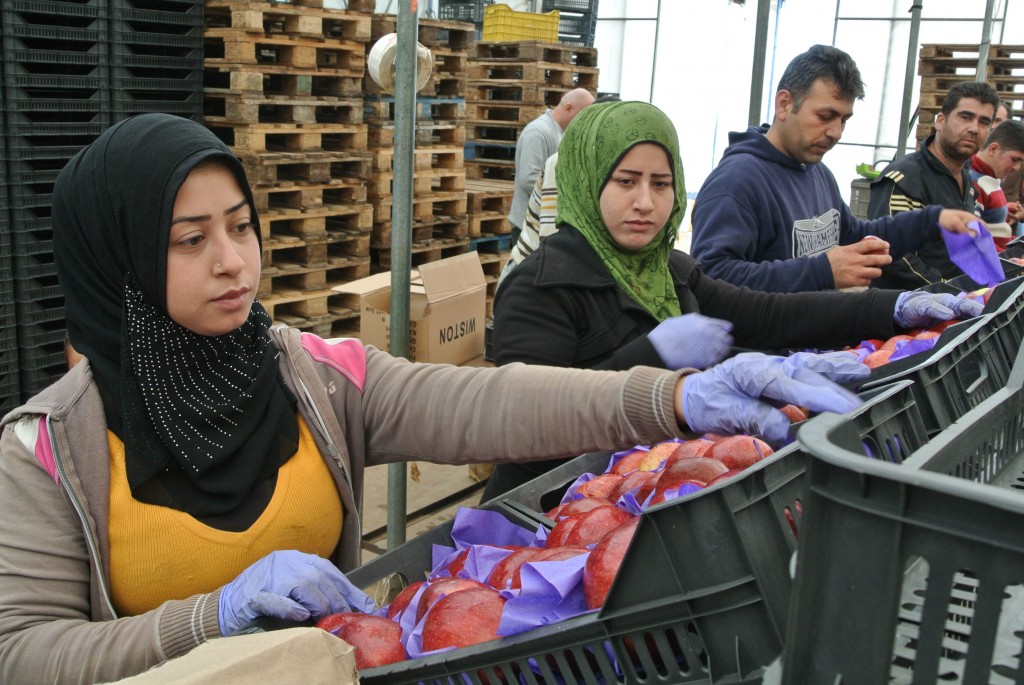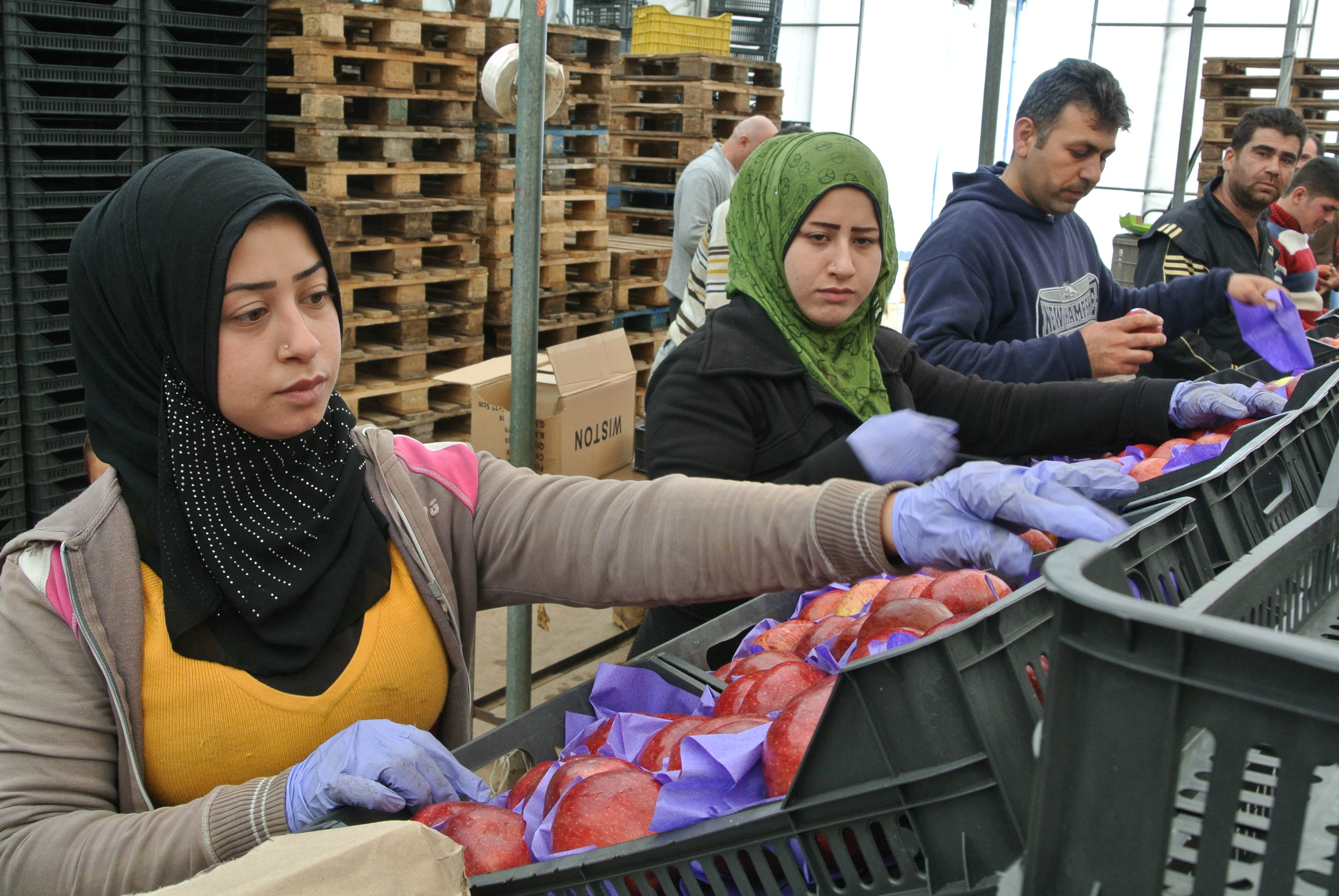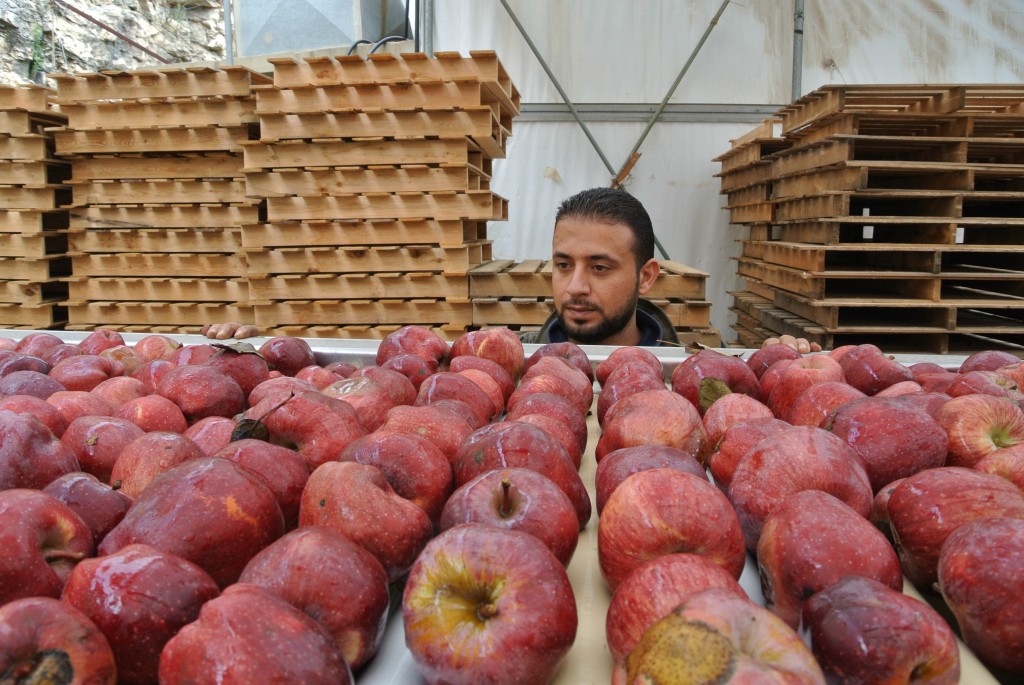 Ghassan Feghali, owner of Lebanese fruit company, Liban Village, knows that the mechanized fruit washing and sorting machine can have tremendous impacts on improving post harvest losses. For the last twenty years, the company’s fruit was sorted manually, costing more in time and quality.
Ghassan Feghali, owner of Lebanese fruit company, Liban Village, knows that the mechanized fruit washing and sorting machine can have tremendous impacts on improving post harvest losses. For the last twenty years, the company’s fruit was sorted manually, costing more in time and quality.
In this business, the distance the apple rolls is carefully calculated. The rubber cups, which carry the apples one by one along the sorter line, are specially designed to capture and release each apple as gently as possible to minimize bruising.
“Apples are sensitive, yes, but consumers are even more sensitive. The cups on this sorter, which were designed by a French firm, are currently one the most significant differentiators in the apple sector,” explains Feghali.
The sorter was installed in January 2015 and is part of Liban Village’s investment under a partnership with USAID. Liban Village invested over $200,000 to install the sorter, and USAID—through its Lebanon Industry Value Chain Development program—provided the firm with 220 solar energy panels, with an 80-kilowatt capacity, to support a sustainable and cost-effective power system.
“The solar system produces enough energy to run the sorter and gives us a chance to sell back excess energy to the utility company,” says Feghali.
The co-investment represents the US government’s strategy to increase production and profitability in food value chains in Lebanon and was born out of President Obama’s Feed the Future initiative, a global strategy to improve food systems and food security in developing nations.
Liban Village was founded in 1992 as a farmer cooperative and grew to a small company that employs more than 50 people each year. Today, Liban Village works across the apple value chain, from production to sorting, packing and storage, as well as providing extension service training for smallholder apple farmers. Liban Village works with over 300 apple growers that employ thousands of laborers on Lebanon’s apple orchards.
To be more competitive and provide a crucial service to farmers and traders, Liban Village installed two large cold storage units in 2006 and 2009, and agreed to give surrounding USAID-partnering apple farmers a 25% discount on using the storage facility for the next five years. USAID also assisted Liban Village with developing unique crates and racks specifically designed for storing apples in cold storage facilities. Typical crates available in Lebanon are usually stacked ten crates deep with no aeration, resulting in losses in quality. Liban Village purchased 10,000 crates, a good start to meet the company’s annual sales of 1500 MT of apples
“Lebanon’s apple growers cannot produce and market without storage and sorting facilities. Farmers depend on Liban Village to process and store their apples, but keeping the units profitable is a continuous struggle for us,” he says.
A Rotten Market
Lebanon’s apple market is saturated and consumption cannot keep up with production. Each year, Lebanon’s apple farmers produce 180,000 MT of apples, and export approximately 70 percent. Lebanese growers have a bad reputation for unpredictability in terms of apple varieties, often cannot meet pesticides and fungicide standards for high-value markets and lack access to financial services.
Outside market forces are also cornering Lebanese apple farmers into the red. The war in Syria has closed important trade routes to Middle Eastern customers; inflation in Egypt has made Lebanon’s number one customer less feasible; and Europe’s big apple producers are turning more and more to secondary markets like Egypt as a result of European Union trade restrictions with Russia.
To meet this problem, Feghali sees the adoption of new apple varieties as the future of Lebanon’s apple orchards, which have a distinct advantage over regional apple growers like Greece. High altitudes, a moderate climate, water resources and rich soil make the small country idea for growing fruit.
Since 2012, the USAID program has reached approximately 400 apple farmers with training and technical assistance in good agriculture practices in production and post-harvest. The program created 10 demonstration plots in important production areas to promote new apple varieties and assisted in the establishment of four Agriculture Production Centers, where farmers can purchase inputs and services as well as aggregate fruit to meet the demands of larger market actors.
“The Gala varieties are originally from New Zeland. Thanks to our high altitude areas, we can adopt this tasty variety and make it our own. The Lebanese Red Delicious variety is another where we can gain a competitive advantage,” explains Feghali.
 About Nicholas Parkinson (Nico Parco)
About Nicholas Parkinson (Nico Parco)
Nicholas is an NGO writer based in Botswana. He has worked on agriculture-focused projects in Ethiopia, Uganda, Zambia, Somalia, and Liberia. He specializes in NGO documentation, communications, and PR, and teaches local writers how to create attention-grabbing stories for their NGOs.
A journalist, climber, husband, and father – as well as companion to Mino, a black and white dog – Nico has lived in several countries and speaks several languages. Today he focuses on writing, documenting, and story telling.
Here is a link to Nicholas’ GoodFood World articles and commentary.


